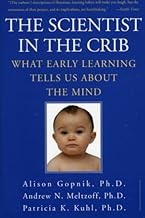Theory Of Mind
Last Updated on March 22, 2024 by pastor.rocklyn
The Scientist In The Crib
Several years ago I read a book about early child development that introduced me to an important concept from the field of cognitive science:
The Scientist in the Crib by Allison Gopnik, Andrew N. Meltzoff, and Patricia K. Kuhl – January 1, 2000
In it the author described a critical transition that children make from being unaware that other people don’t share their experiences to realizing that other people have their own independent set of experiences and knowledge – they develop theory of mind.
More recently, while preparing for a sermon, I wanted to illustrate why narrative was such an important component of how God uses the Bible in our lives. I realized that theory of mind explains why we attribute motivations and feelings to characters in a narrative. Towards this end, I found a couple of videos that I used to explain the concept in our New Year’s Eve sermon.
Sally Anne Tasks
Sally Anne tasks are a tool used by cognitive scientists to demonstrate what children understand about the mental state of another human being.
What Is Theory Of Mind?
This second video provides some broader insight into theory of mind.
Theory of Mind and Stories
After a certain age children develop a “theory of mind”. This enables them to understand how others view the world. Note that, before you develop theory of mind, you assume that everyone else knows what you know. Lying to others would mean lying to yourself. Once you develop theory of mind however, you realize that you sometimes have information that others do not have. Once a child inevitably develops theory of mind he/she may have a greater incentive to lie.
Theory of mind allows us to better understand how we process information. We ascribe perceptions and intentions to the real people around us. We also ascribe perceptions and intentions to the people we read about in narratives.
The Bible contains narrative, poetry, and prose discourse.
Bible Project: Biblical Literary Styles Bible Intro
A person reading or listening to a prose discourse passage in the form of commands or doctrine may choose to disagree with that passage. When that same person encounters a narrative passage however, theory of mind forces him/her to ascribe perceptions, and intentions to the characters in the narrative. Thus God’s message in the text, conveyed by a character’s words and behavior, can “slip in” on the narrative and somewhat “under the radar” of the reader’s (or listener’s) philosophical inclinations.
Modern western theological inclinations can lead us to emphasize prose discourse passages with well-defined doctrinal content at the expense of biblical narrative. Theory of mind gives us a reason to be more balanced in our approach.
Let’s not forsake reading, studying, and meditating on biblical narrative!



Comments
Theory Of Mind — No Comments
HTML tags allowed in your comment: <a href="" title=""> <abbr title=""> <acronym title=""> <b> <blockquote cite=""> <cite> <code> <del datetime=""> <em> <i> <q cite=""> <s> <strike> <strong>